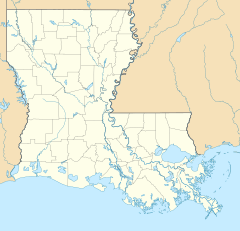Grand Ecore, Louisiana facts for kids
Quick facts for kids
Grand Ecore
|
|
|---|---|
| Country | United States |
| State | Louisiana |
| Parish | Natchitoches |
| Elevation | 147 ft (45 m) |
| Time zone | UTC-6 (Central (CST)) |
| • Summer (DST) | UTC-5 (CDT) |
| ZIP code |
71457
|
| GNIS feature ID | 548998 |
Grand Ecore is a small, unincorporated community in Natchitoches Parish, Louisiana, United States. This means it's a group of homes and businesses that isn't officially a town or city. It's located north of the city of Natchitoches, right next to the Red River of the South.
Grand Ecore is known for its beautiful views and interesting past. The US Army Corps of Engineers has a visitor center there. From the center, you can see amazing panoramic views from a bluff that's 80 feet above the Red River. The area is also famous for its history, including important Civil War sites. Plus, it's a great spot for outdoor activities like hiking and fishing tournaments!
A Look Back: Grand Ecore's History
Grand Ecore has a very long and rich history.
Early Settlers: Caddo Indians and French Colonists
For a very long time, the Caddo Native American people lived on the lands around Grand Ecore. They were the first to call this place home.
Later, in 1718, some people from Lyons, France, came to settle the area. They were led by the Brossart brothers. Among the first to receive land and live near the Natchitoches Indians (who were also a Caddoan tribe) were Louis Latham, and Pierre and Julian Beson.
Plantations and Forts
Over the next 70 years, the French and then the Spanish governments gave out land grants. Important families like Bossier, Grappe, Prudehomme, Brevelle, and Metoyer received land. These families ran large farms called plantations along the Red River and Cane River.
Around the early 1800s, a doctor named Dr. Sibley bought Grand Ecore. He also bought 500 acres of land on the other side of the Red River.
In 1820, Fort Selden was built near Grand Ecore. It was located on Bayou Pierre. Soldiers from the 7th Infantry, led by Lieutenant Colonel Zachary Taylor, were stationed there. These soldiers were from Arkansas. However, in 1822, the 7th Infantry moved to a new location, which later became known as Fort Jesup.
 | Leon Lynch |
 | Milton P. Webster |
 | Ferdinand Smith |


